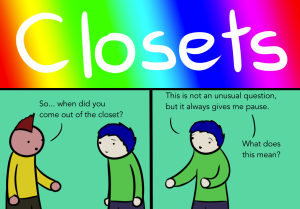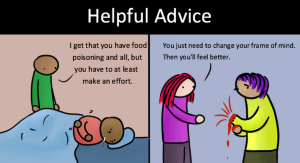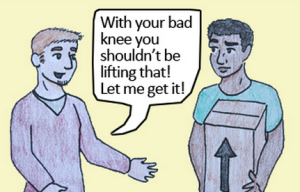At first it was only little comments.
Your partner would shake their head disapprovingly after you dyed your hair. They’d scoff at your taste in music.
After a while, though, you couldn’t just laugh it off, pretending it didn’t bother you.
Your partner was belittling you in front of friends and family – even strangers! They told you it was just gentle teasing, and for a while you agreed and chalked it up to you being overly sensitive.
It didn’t stop stinging though.
You decide to tell your partner that their teasing hurts your feelings. You explain to them that even if they don’t mean it, you don’t like it, so could they please not do it?
You don’t expect them to start crying.
You don’t expect them to call themselves the worst person on earth and beg you not to leave them even though they’re so terrible. “I feel so bad for doing that,” they say. “I should just disappear.”
You get alarmed. Your partner has depression, so it’s scary to hear them say something like that. Even if you’re the one whose feelings were hurt, you can’t stand to see your partner hate themselves so much.
Maybe you should have known better than to bring it up, anyway. Their depression already exacerbates their self-loathing, and it was only a little teasing. Why did you have to make them feel bad because you overreacted?
It’s your turn to beg. You plead with them not to hurt themselves and tell them that everything’s okay. They’re not a bad person at all.
They eventually calm down, and you’re relieved that things turned out okay.
It’s not until later that you realize that they never apologized for hurting your feelings in the first place.
***
If a significant other has ever done something similar to you, please know that they were being abusive.
Abuse is about control. An abusive partner is one who seeks to gain power over their significant other. They attempt to control what their partner does, who they speak to, and even how they react to things (like “teasing”).
Abusive partners use a variety of tactics to control their significant other. And it can be difficult to recognize those tactics because mainstream media and society teaches us that abuse is actually romantic behavior.
It can be even more difficult to recognize abusive behavior when your partner has depression.
Depression requires understanding and patience, so you might mistake your partner’s attempts to control you as requests for support and love.
But the truth of the matter is that controlling behavior is abusive behavior. It has no place in a healthy relationship.
So, how can you tell whether your partner is abusive or simply asking for support?
In short: The difference lies in whether they make a demand or a request.
A request leaves the other person free to say yes, to negotiate, or even to refuse. You should support your significant other, but you can only do so much. You have your own needs as well as your own limits.
A demand, on the other hand, leaves no room for your input. If your partner expects you to agree to everything they ask, they are making a demand. And that’s a red flag for abusive behavior.
People with depression are no less immune to abusive behavior than people without depression. However, when an abusive partner has depression, things get complicated.
Your partner may use the same tactics as other abusive people, but they may attempt to obscure the fact by using their depression as an excuse. After all, it’s not abuse if they’re doing it because of their mental health, right?
Wrong.
Depression doesn’t lead to abuse, and not all people with depression are abusive. It’s more accurate to say that sometimes, abusive people also have depression.
And if people with depression are capable of controlling behavior, then they are also culpable for it.
In the following sections, I’ll be unpacking the ways in which abusive partners use their depression to excuse their controlling behavior.
I’ll talk about a specific behavior, why it’s abusive, and how they may use their depression to make it seem otherwise. Then I’ll talk about the ways in which someone who has depression but isn’t abusive would handle the situation.
That way, you can work through the experiences that you have with your own partner and start to come to a conclusion about whether or not what you’re experiencing is abusive behavior.
Keep in mind that the most important thing is control: Is your partner attempting to control you, or do they respect your say in all matters?
Let’s take a look.
1. Do They Make You Spend All of Your Time with Them?
In high school, I dated someone who was abusive. I didn’t know it was abuse at the time, but when I look back, the signs are clear.
One of the clearest signs was that he made me spend all my time with him – or doing something for him.
If I so much as talked to someone else without him, he would get upset and make me feel as if I was a neglectful partner.
I didn’t think of it as abusive behavior because he had depression. He called me the light of his life, one of the few good things he had going for him. So if he wanted me to spend all my time with him, it was because he needed me to alleviate his depression. If I wasn’t around, he would be miserable.
It’s only now that I know that his behavior was abusive and had nothing to do with his depression. He was trying to control how I spent my time and on whom I spent it.
The fact that I couldn’t do something on my own without worrying that he would get upset about it was a sure sign that he was abusive, but he excused this behavior by acting as if keeping me by his side was necessary to his mental health.
Of course, it’s natural for your partner to be lonely without you, particularly if they have depression. Take it from someone who has chronic depression. My partner is a big support to me, so I miss her when she’s not around.
However, I don’t demand (or even expect!) her to spend all her time with me. She’s not just support for me. She’s an autonomous person with her own needs.
So when she hangs out with friends or family, I’m fine. I find my own thing to do because I’m perfectly capable of doing so.
Most importantly, I know that my partner isn’t responsible for my mental health. Only I can manage it, and I have a strong suspicion that abusive people who have depression know this as well.
They just make their partners feel responsible in order to control how their partners spend their time.
2. Do They Threaten Suicide When You Have Disagreements?
Abusive partners use fear to control their significant others. Physical violence is one way they instill fear. Threatening to harm themselves is another.
Your partner may never lay a hand on you, but that doesn’t mean that they’re not trying to intimidate you. If they threaten to harm or kill themselves whenever there’s a disagreement, they are being abusive.
The disagreement could range from your calling out something problematic they did to your not complying with something they demanded of you.
What it boils down to is that you aren’t doing what they want you to do: letting them have their way.
Sometimes they don’t use direct threats. I’ve known abusive partners who would become upset if their significant others told them they did something hurtful.
They would harangue themselves to the point where their significant other became worried that they would harm themselves. At that point, their significant other would have to put the actual issue aside and comfort their partner instead.
Don’t mistake this behavior as a part of mental illness.
When my partner tells me I did something to hurt her, it dredges up a lot of self-loathing. My depression already has me convinced that I’m a terrible person, and knowing that I hurt someone I care about only reinforces the feeling that I should just disappear.
Nobody can control how they feel. However, full-grown adults can control how they act.
I can’t stop the self-loathing from rising, but I can find the wherewithal to apologize to my partner and promise not to do the hurtful thing again.
The biggest sign that an abusive person can control themselves – even with depression –is that they strategically choose when to threaten suicide. They do it exactly when you don’t comply with them.
And by threatening suicide, they hold their safety over your head and force you to always let them have their way.
3. Do They Make You Feel Responsible for Their Mental Health?
There are many reasons why someone who’s in a relationship with an abusive partner might not want to leave them.
And sometimes, it’s because they feel like they’re the only ones who can take care of their partner.
Maybe their partner has abusive parents, or is struggling to find a job. Whatever the reason, they feel that without them, their partner wouldn’t be able to cope.
This isn’t how it should be.
There’s a difference between supporting your partner and holding their life together. For starters, the latter is impossible.
If you feel responsible for holding your partner’s life together, it’s because they made you feel that way.
Maybe they say things like “You’re the only good thing in my life.” Maybe they lash out at you when they’re having a bad day and blame you for every little thing until you feel as if you’re responsible for their poor mood.
Sometimes they may even engage in destructive behavior if you say that you want to leave (see the above section about threatening suicide).
Abusive partners with depression might excuse this behavior by telling you that it’s because they have depression. Their mental health makes them dependent on you, so it’s actually normal for you to have to take care of them.
This is absolutely untrue.
No matter how bad your partner’s life is, you can’t fix it.
They know it, too. They’re just trying to play on your guilt in order to control you.
If you feel obligated to care for them, it’s easier for them to tell you what to do in the name of “curing” their mental health.
Instead of expecting you to simply fix their problems, a good partner will ask you explicitly what they need in the way of support. They’ll also inquire about and respect what you can’t do.
They won’t try to guilt you into catering to their every whim.
I ask my partner to do little things for me when I’m upset, like hold my hand or bring the ice cream from the freezer. Neither of these things fixes whatever problem I’m having, but they do help me feel a little better – and that’s all I can ask for.
It’s also all that’s fair for me to ask for.
4. Do They Trivialize Your Problems in Comparison to Theirs?
My ex-boyfriend would always act as if my problems weren’t as big as his.
For instance, if I talked about my family having financial difficulties, he would say that at least we had more money than his did.
Abusive partners will try to make you feel as if you don’t have as many problems as they do. That way, you’ll have to cater to their needs while they won’t need to lift a finger to help you.
Abusive partners who have depression will use their depression to substantiate the claim that you aren’t suffering as much as they are. You might be sad, but they have depression. Therefore, all your problems are null.
Does your partner never have time to listen to your problems? When you try to bring problems up, do they dismiss them as trivial and imply that you’re selfish for trying to talk about yourself when they have it worse?
If they do any of that, then they’re being abusive.
They’re trying to manipulate you into dismissing your own problems. That way, they’ll be the one who suffers more in the relationship – or, in other words, the one worthier of receiving care.
The thing is, even if you don’t have depression, your problems are legitimate. It’s not a zero sum game where only people with depression truly suffer.
A good partner acknowledges their significant other’s struggles. They give as much care and support as they receive because they know that every relationship is a two-way street.
If your partner dismisses your problems, it’s not a sign that your problems are petty. It’s a sign that they’re trying to control the relationship so that it’s all about them.
And that’s not okay. Ever.
***
This list is far from complete. There are many other red flags for an abusive partner, such as constant lying or belittling behavior.
Whether you’ve seen signs that are on this list or not, you should trust your instinct. Remember that an abusive partner attempts to exert power over you so that they can control you.
Ask yourself: do they allow you to negotiate a request, or do they expect you to just do whatever they tell you to?
If your partner is abusive, the following are a few links where you can learn more and get help:
- Signs of an abusive relationship and a list of resources
- Signs of emotional abuse
- Resources for LGBTIQ+ relationships, legal advice, and more
- Developing a safety plan
- Family law legal resources
Lastly, I know it’s scary to acknowledge that your partner is abusive, especially if they have depression. You care about them, so you don’t want to hurt them. It might not seem like a big deal to bury what seem like little misgivings.
But the thing is, you can’t give all of yourself to them without something in return. That’s just how it works. If they’re getting your care and support, you deserve to get theirs, too.
And someone who doesn’t agree with that, quite frankly, is someone you’ll be happier without.
[do_widget id=’text-101′]
Kerry Truong is a Contributing Writer for Everyday Feminism. They are a queer diasporic Vietnamese womxn and graduated this spring with a double degree in English and Asian American Studies. When they’re not philosophizing about this at length, they’re reading, taking long walks, or cooing over all the dogs who cross their path. Read their Everyday Feminism articles here.
Search our 3000+ articles!
Read our articles about:
Our online racial justice training
Used by hundreds of universities, non-profits, and businesses.
Click to learn more
Most Read Articles
- « Previous
- 1
- …
- 30
- 31
- 32




















